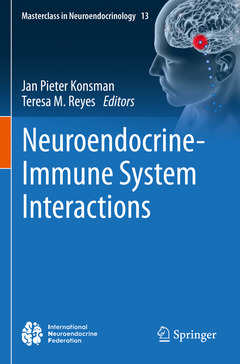Neuroendocrine-Immune System Interactions, 2023 Masterclass in Neuroendocrinology Series, Vol. 13

The concepts of the neuroendocrine system and the immune system emerged more or less simultaneously in the second half of the 20th century. Although these systems have a high degree of autonomy, it has also become clear that they interact in many ways and at different levels. This book focuses on the neuroendocrine and immune interactions that are fundamental to normal development and maintenance of health.
The first introductory chapters are devoted to the historical and philosophical concepts within the field, as well as evolutionary considerations, offering critical interdisciplinary perspectives on the development of this field of research. Without attempting an exhaustive overview, the book then introduces some of the regulatory pathways that mediate interactions between the neuroendocrine and immune systems and examines modulating factors such as age and sex. In addition, several chapters address the importance of neuroendocrine-immune interactions in some disease states.
Readers can expect to gain a broad perspective of neuroendocrine-immune interactions in development, health, and disease, along with a critical evaluation of current methods used in the field. Given its scope, the book is essential reading for undergraduate and graduate students with an interest in neuroendocrinology, neuroimmunology, and neuroscience, as well as postdoctoral fellows and established researchers seeking a comprehensive overview and historical perspective of the field of neuroendocrine-immune interactions.
Jan Pieter Konsman, received a Master’s Degree in Neurobiology from the University of Groningen, the Netherlands. He obtained his PhD from the Bordeaux University in France for his work on immune-to-brain communication. He then did his post-doctoral training at the University of Linköping in Sweden working on the distribution of the interleukin-1 receptor in the rodent brain. Dr. Konsman next took up a permanent position at the Centre National de Recherche Scientifique in France working on neuroimmune substrates of disease-associated anorexia and encephalopathy. He also holds a Master degree in History and Philosophy of Science and is interested in interdisciplinary approaches of the mind-body problem.
Teresa M. Reyes received her PhD in Psychology from the University of Wisconsin-Madison in which she examined how circulating cytokines affect memory and behavior in a non-human primate model. For her postdoctoral training, she joined the Laboratory of Neuronal Structure and Function, at the Salk Institute for Biological Studies in La Jolla, CA. Here she extended her training to neuroanatomical studies of neuroimmune interactions using rodent models. Dr. Reyes is currently on the faculty of the University of Cincinnati, College of Medicine within the Department of Pharmacology and Systems Physiology. Dr. Reyes’s research program is focused on identifying the mechanisms that underlie the effect of adversity in early life on brain development, with a specific interest in neuroimmune interactions and cognition.
Date de parution : 03-2024
Ouvrage de 386 p.
15.5x23.5 cm
Date de parution : 03-2023
Ouvrage de 386 p.
15.5x23.5 cm



